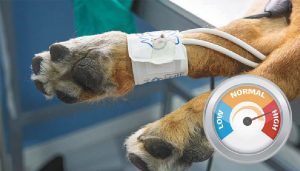

Obesity: Just like in humans, obesity is a leading cause of high blood pressure in pets. Extra weight puts extra strain on the heart, leading to an increase in blood pressure.
Kidney Disease: Kidney disease can cause hypertension in pets by affecting the kidneys’ ability to regulate blood pressure.
Hyperthyroidism: Overactive thyroid glands can cause hypertension in cats.
Cushing’s Disease: This condition, which causes an overproduction of cortisol hormone, can lead to hypertension in dogs.
Aging: As pets age, their blood vessels become less elastic, and their blood pressure tends to increase.
Symptoms of High Blood Pressure in Pets
High blood pressure in pets can be asymptomatic, meaning there are no obvious signs of the condition. However, in some cases, pets may exhibit the following symptoms:
. Seizures
. Blindness or other vision problems
. Disorientation or confusion
. Nosebleeds
. Difficulty breathing
. Weakness or lethargy
. Loss of appetite
. Vomiting
. Increased thirst and urination
If you notice any of these symptoms in your pet, it is essential to take them to a veterinarian immediately. Early detection and treatment can prevent complications and improve your pet’s quality of life.
Treatment of High Blood Pressure in Pets
The treatment of high blood pressure in pets depends on the underlying cause of the condition. In some cases, managing the underlying condition can resolve the hypertension. For example, weight loss can help manage hypertension in obese pets, and treating kidney disease can help regulate blood pressure in pets with kidney problems.
In other cases, medication may be necessary to control hypertension. There are several medications available to treat high blood pressure in pets, including angiotensin-converting enzyme (ACE) inhibitors and calcium channel blockers. These medications work by relaxing the blood vessels, which lowers blood pressure.
In addition to medication, lifestyle changes can also help manage hypertension in pets. For example, feeding your pet a healthy diet, ensuring they get regular exercise, and reducing stress can help manage hypertension.
High blood pressure is a common condition that affects pets, and it can lead to serious complications if left untreated. As a pet owner, it is essential to be aware of the causes, symptoms, and treatment of hypertension in pets. Regular veterinary checkups can help detect hypertension early, and early treatment can prevent complications and improve your pet’s quality of life. By making lifestyle changes and working with your veterinarian to manage your pet’s hypertension, you can help ensure that your furry companion lives a long and healthy life.
Contact Animal Oasis Veterinary Hospital to schedule a wellness exam, vaccinations, and calming medications for your pets today!
Animal Oasis Veterinary Hospital in Naples offers the most up to date and progressive veterinary services for your pets. Ranging from laser surgery, ultrasound, dental X-rays, radiology, full pharmacy, and in house diagnostics, Animal Oasis Veterinary Hospital provides your pets with the necessary options for treatment.
Animal Oasis Veterinary Hospital
239-431-9667
www.aovethospital.com
 Southwest Florida's Health and Wellness Magazine Health and Wellness Articles
Southwest Florida's Health and Wellness Magazine Health and Wellness Articles

